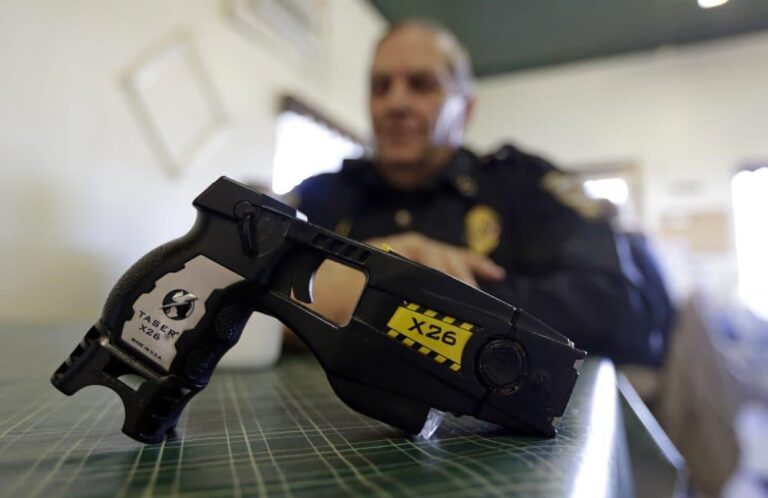Table of Contents
- Understanding the Legal Status of Stun Guns in Massachusetts
- Navigating Restrictions and Permits for Ownership
- Safe and Responsible Use Guidelines for Stun Gun Owners
- Recommendations for Complying with Massachusetts Stun Gun Laws
- In Retrospect
Understanding the Legal Status of Stun Guns in Massachusetts
In Massachusetts, the possession and use of stun guns are regulated under specific state laws that classify these devices as a form of “dangerous weapon.” Unlike traditional firearms, stun guns fall under less commonly highlighted statutes, making awareness crucial for lawful ownership. It is important to understand that Massachusetts law requires individuals to have a valid firearm identification (FID) card or a license to carry firearms to legally possess a stun gun. This means that even though stun guns are not firearms, their ownership is treated with similar legal gravity, emphasizing the state’s cautious approach toward less-lethal self-defense tools.
When assessing whether you can carry or use a stun gun legally in Massachusetts, keep these key points in mind:
- Location restrictions: Stun guns are prohibited in sensitive areas like schools and government buildings.
- Age requirements: Owners must usually be 18 years or older, consistent with FID card regulations.
- Use limitations: Use of a stun gun must be strictly for self-defense and not for unlawful activities, or else it could lead to criminal charges.
Navigating Restrictions and Permits for Ownership
Massachusetts imposes specific restrictions on stun gun ownership to ensure public safety while allowing responsible individuals access to self-defense tools. Residents must be aware that stun guns are not classified uniformly across jurisdictions, and state law mandates certain qualifications to legally possess one. For instance, individuals may need to be at least 18 years old and free from felony convictions or restraining orders. Additionally, the use or possession of a stun gun on school grounds, government buildings, or public transportation is often prohibited, so recognizing these location-bound restrictions is crucial.
While Massachusetts does not require a traditional firearms permit for stun guns, the law does include provisions requiring responsible ownership. You might need to obtain a specific permit depending on your city or municipality, as some local governments enforce their own regulations supplementing state law. Compliance with registration requirements or background checks might also be part of the process in certain areas. To navigate this complex landscape effectively, potential owners should consult both state statutes and local ordinances and consider seeking legal advice or contacting law enforcement agencies to confirm the current permit and registration mandates.
- Minimum Age Requirement: Typically 18 or older
- Criminal Background Checks: Restrictions for felony convictions
- Location Restrictions: No stun guns allowed in specified public areas
- Local Permit Variations: Some cities require additional permits or registrations
Safe and Responsible Use Guidelines for Stun Gun Owners
Responsible ownership starts with understanding that while stun guns can provide a valuable layer of personal security, they must be handled with care and respect. Always store your device securely, out of reach of children and unauthorized users to prevent accidental discharge. Regularly inspect your stun gun to ensure it remains in proper working condition, and familiarize yourself with its operation before considering it as part of your self-defense plan. Remember, the goal is to protect yourself without causing unnecessary harm or legal complications.
When carrying a stun gun in public, adhere strictly to Massachusetts state regulations, which include limitations on where and how you may use it. Never brandish or deploy your stun gun in a manner that can be perceived as threatening unless faced with a legitimate self-defense situation. Key practices include:
- Keep the stun gun concealed to avoid escalating confrontations.
- Use the device only in genuine emergencies to stop an attack or protect your safety.
- Know the local laws regarding stun gun possession and usage areas, as some places may have restrictions or require permits.
Recommendations for Complying with Massachusetts Stun Gun Laws
To ensure you remain within the legal boundaries when owning or carrying a stun gun in Massachusetts, it’s critical to understand the state’s specific restrictions. First and foremost, stun guns are generally prohibited for public carry unless you have a valid firearms identification card or a license to carry firearms. Always verify your eligibility and make sure to comply with any application processes for appropriate permits. Secondly, avoid possession in sensitive places such as schools, government buildings, and other designated zones where stun guns are explicitly banned.
Besides legal compliance, practicing safe and responsible use is essential from both a legal and ethical standpoint. Consider the following:
- Store stun guns securely and away from children or unauthorized users.
- Keep detailed records of your purchase and any permits obtained.
- Stay updated on recent legal changes in Massachusetts stun gun laws by regularly consulting official state resources or legal advisories.
- Take a safety training course to learn proper handling techniques and understand when use is justified under state law.
In Retrospect
In summary, understanding the stun gun laws in Massachusetts is essential for anyone considering the use or possession of these devices. With strict regulations and specific legal requirements in place, staying informed helps ensure you remain compliant and avoid potential legal issues. Whether for personal protection or professional use, always prioritize safety and legality. Keep these key facts in mind, and you’ll be better equipped to navigate the complexities of Massachusetts stun gun laws confidently and responsibly.Check Our Other Blogs
- StunGun – Your Trusted Source for Stun Guns, Laws, and Self-Defense Tips
- PepperSprayLaws – Your Trusted Resource for Pepper Spray Information
- StunGunLaws – Your Trusted Guide to Stun Gun Legality and Safety



